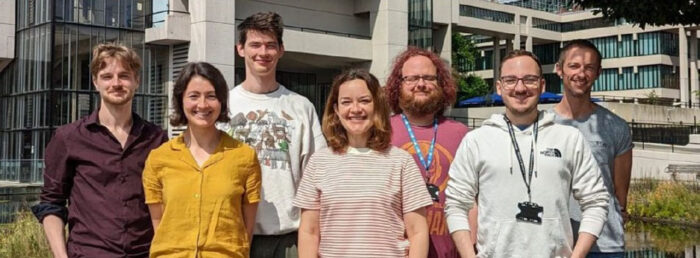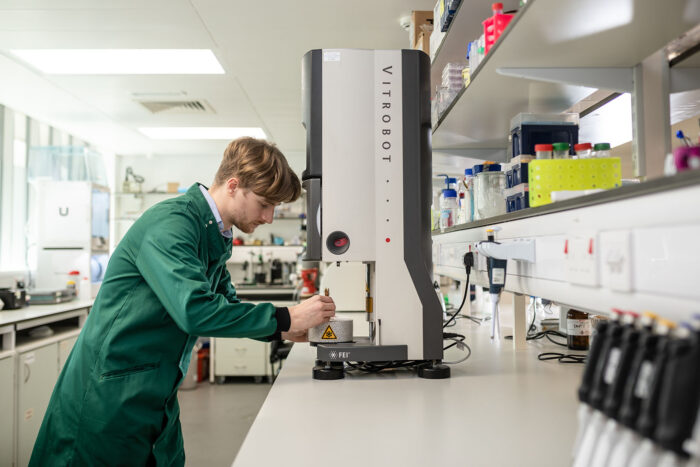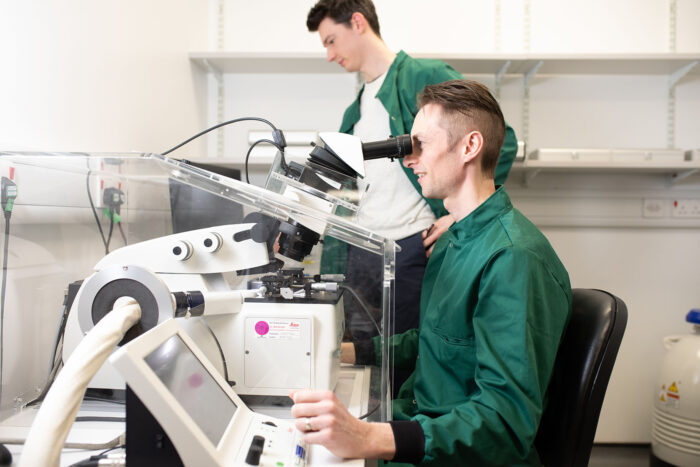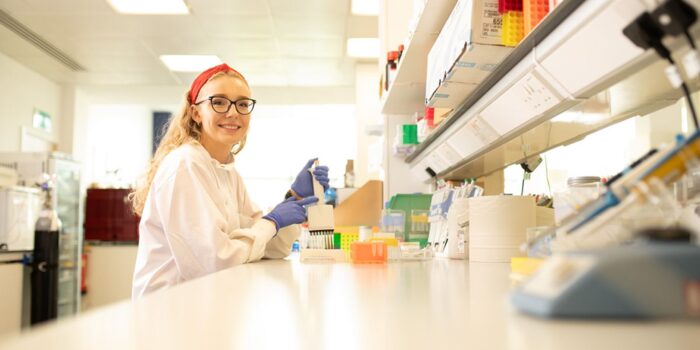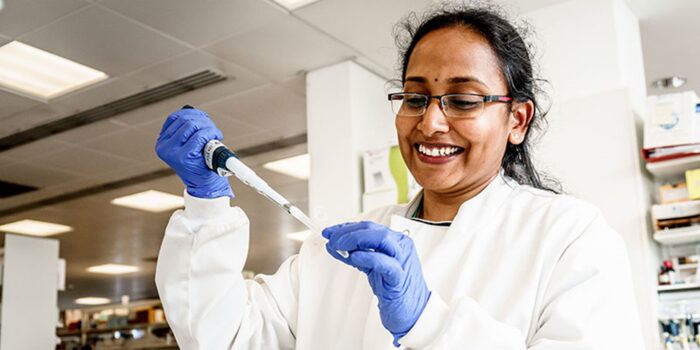Cheney PhD
The Cheney Scholarship 4-year PhD Scheme in in situ structural biology
Applications are now invited for up to 2 new scholarships, commencing October 2024. The application deadline is Tuesday 7th May 2024 and interviews will take place on Thursday 16th May 2024.
Structural biology is a uniquely powerful tool, that can reveal molecular details of the interactions that drive fundamental biological processes (and become dysregulated in disease), the interactions between hosts and pathogens, and the mechanism of action of targeted therapies. In recent years, cryo-electron microscopy (cryoEM) has transformed Structural Biology, allowing larger and more complex structures to be solved, and Leeds has become a global player owing to its sustained investment in this area. This trend towards increasing complexity is accelerating, and structural biology is now bringing new capability that allows us to look at protein complexes inside the cell or tissue to understand how they function ‘in situ’. High resolution structures remain of enormous interest, but we want to know not just “what a structure is”, but how structures depend on their cellular location, interactions with other molecules, and how this affected by drugs. In essence we need to understand how structures change in time and space as a healthy cell enters disease, and what changes when we treat such diseases.
Until very recently structural molecular biology has been dominated by studies on purified proteins and the complexes they make, but recent advances in microscopy mean that we are now beginning to be able to study structures within cells or tissue. This new discovery science is driven by state-of-the-art imaging, focused ion beam thinning of specimens, and cryo-electron microscopy/tomography, all available at the University of Leeds, and supported by outstanding facilities in e.g. biomolecular NMR (nuclear magnetic resonance), mass spectrometry, super-resolution light microsopy and AFM (atomic force microscopy). This emerging field is fascinating and has vast potential rewards. The ultimate prize is to better understand biology, and discover more effective, targeted medicines with fewer side effects that can transform human health and well-being.
With this in mind, and with generous funding from Leeds Alumni Peter and Susan Cheney, we are establishing the Cheney Scholarship 4-year PhD Scheme to develop a new generation of scientists who can tackle the most challenging problems in Biology and Medicine.
The Structure of our Programme
We seek to create a new generation of scientists who think differently, are passionate about doing research and will go on to transform our understanding of important biomedical problems. The Cheney Scholarship programme will be based in the Faculty of Biological Sciences and brings together world class researchers from across the Astbury Centre for Structural Molecular Biology and the Leeds Biomedical Research Centre based in the School of Medicine. We provide a vibrant, interdisciplinary environment, that extends from the physical sciences to clinical medicine. We also provide an outstanding positive research culture, where you can develop your skills and flourish.
In the first six months, you will carry out two, ten-week rotation projects before choosing your final PhD project, alongside introductory practical classes in microscopy and structural methods. This will allow you to explore your ideas and put together a final project proposal tailored to your interests. You will then have the opportunity to focus on your main PhD project for the remaining 3.5 years of your scholarship, alongside bespoke training that will include life skills and resilience, public engagement, entrepreneurship and translation and much more.
Highlights of the programme
- Support from a dedicated programme co-ordinator
- A mentorship scheme where we help you to find an experienced mentor outside of your supervision team
- Access to truly world class research facilities for in situ structural biology
- Maximized time for the main PhD project
- Support for career development and travel
- Opportunities to publish your research and a review article
- Extensive relevant taught and real-life training experiences
- Wide multidisciplinary supervisor pool (including clinician-scientists)
- Financial support
Applications for 2024 entry are now open
Cheney Scholarships will be awarded to candidates on the basis of their potential, and we will not recruit to specific projects. Project teams will be built during the first six months of the scholarship, aligned with researchers within the Astbury Centre for Structural Biology and the Leeds Biomedical Research Centre, who lead world-class research programmes. Areas might include (but are not limited to):
Neurodegeneration. Neurodegeneration is a scourge in our ageing population. Our research seeks to understand how protein aggregation in the brain leads to loss of neural cells, memory loss and dementia. We are seeking to understand the formation of amyloid aggregates of Aβ (Alzheimer’s) or α-synuclein (Parkinson’s) in brain, studying their structures, intra-extracellular dynamics, and the contribution of cellular environment to aggregation and toxicity, to inform next generation diagnostics and therapeutics.
Virology. Viruses are a major determinant of human health, affecting the immune system and contributing to cancer, especially across minority segments of our population with restricted access or socioeconomic resistance to vaccines. We are working to dissect the molecular roots of host response biology (HRB). Projects could focus on how healthy cells are transformed into cancerous ones, responses to vaccines or how immune surveillance is evaded. This research will inform the development of direct-acting drugs to directly modulate HRB.
Antimicrobial resistance. Antibiotic resistance is a slow-moving pandemic that without urgent action will transform society in the next 30 years. We are working across multiple targets, but are focussing on the outer membrane of Gram-negative pathogens; the most pressing need and the hardest to tackle. Projects could include understanding protein structure/function in real bacterial membranes, working with clinically-relevant pathogens, with microbiologists to discover new natural products, and chemists to discover new small molecules antibiotics.
Immunology and Inflammation. Inflammation is our natural response to injury, from wounds to infection to cancer and it is driven by our immune system. Failure in regulating crucial on/off switches is at the heart of autoimmune diseases and cancer progression. We are working on regulation of the immune response with structural biologists and translational clinicians, to inform the next generation of therapeutics able to dial the immune response up for infection and in cancer, or down for autoimmune diseases.
Cancer Biology. The dysregulation of cell division leads directly to cancer, and the molecular events that lead to such dysregulation, including mutations to protein kinases and DNA damage is a major focus. The Leeds Cancer Research Centre has recently pulled together major players in this field who study dysregulation of signalling and DNA damage, with clinical oncologists and chemists. Transformative discoveries are urgently needed to target specific proteins, and to develop new diagnostics that can identify cancers much earlier.
Cardiovascular and Metabolic diseases. Diabetes and cardiovascular disease are individually major causes of mortality, but the multimorbidity caused by both together is a major societal problem. Researchers in Leeds are investigating the molecular underpinning of both diabetes and cardiovascular disease, and trying to develop new tools to diagnose and treat such diseases. Projects could include work on the structure of myosin motors, systemic amyloidosis, the structure and function of ion channels, and the molecular mechanisms of insulin resistance.
Entry Requirements
- Applicants must be eligible under the UK Home Fee status criteria. Academic fees are included in the scholarship awarded to successful candidates.
- Applicants will have, or expect to obtain, (a) a degree equivalent to at first class undergraduate degree, or (b) a degree equivalent to an upper second class undergraduate degree AND a Masters level degree with Distinction or Merit. Degrees need to be in a relevant subject area including; biochemistry, biological sciences, structural biology, biomedical sciences, imaging, chemistry or physics.
- Applicants applying should not already have been awarded a doctoral degree.
- Applicants whose first language is not English must meet the Programme’s English language requirements (IELTS Academic at 7.0 overall with no less than 6.5 in each component skill).
- We welcome applications from all suitably qualified candidates. We particularly encourage applications from under-represented groups. All scholarships will be awarded on the basis of candidate potential.
Funding Information
This scholarship will cover the cost of academic fees (at the UK Home Fee rate for postgraduate researchers) and an enhanced PhD stipend (£21,099 - £23,055), based on 2023/24 rates. Each scholarship also includes budgets for research consumables, facility access, training, and funding to attend relevant scientific meetings.
How to apply
All applicants must completed an online application form, in which you will need to upload the following supporting documents. As part of the online application, you will need to upload the following mandatory supporting information and documents:
1. Supporting statements:
a. A summary of your academic and employment achievements. Please highlight any awards, scholarships or outstanding achievements, such as excellent module results, project outcomes and final/predicted grades and include the subjects of your previous degrees. Maximum 200 words*
b. An explanation of your motivation to do a PhD within our Cheney Scholarship scheme. Please include why you want to study for a PhD, your suitability for our programme and interest in in situ structural biology. Maximum 200 words*
c. A description of a situation in which you have gathered evidence, used this evidence to come to conclusion(s) and inform action(s). This is a competency-based question designed to show your skills and potential. Your answer could include an experience from research, employment, voluntary work, committee membership or education. Maximum 200 words*
* Please do not mention your name, gender identity or institutions you have studied at. We are operating part of our shortlisting process with this information anonymised as part of our EDI strategy to increase diversity in STEM.
Responses exceeding the word limit will receive a reduced score.
2. A 2 page Academic CV.
3. Degree certificates and transcripts both for undergraduate and postgraduate studies as appropriate (or marks so far if still studying)
4. References from academic referees. Offers are subject to satisfactory references. Please ensure you have named your referees on your application form. We will contact all referees directly as part of the application process.
5. Evidence of English language ability, if applicable
6. An Equality, Diversity and Inclusion questionnaire. Candidates will receive a link to an EDI questionnaire when they have submitted an application. All responses are anonymous and data would only ever be used in aggregate to avoid identification of individuals. The questionnaire includes a ‘prefer not to say’ option against each question if required. The information you provide on this questionnaire will not be used in the shortlisting process.
To help us identify that you are applying for this opportunity please ensure you make it clear that you are applying for the Cheney Scholarship PhD scheme.
Enquiries regarding the application process should be directed to the Faculty of Biological Sciences Graduate School:
For any queries about the Cheney Scholarship 4-Year PhD Scheme, contact us at:
CheneyPhDProgramme@leeds.ac.uk
Selection process
Applications are now invited for up to 2 new scholarships, commencing October 2024. The application deadline is Tuesday 7th May 2024 and interviews will take place on Thursday 16th May 2024.
Interviews will last 30 minutes. We do not require interviewees to give presentations. We will provide details of the interview process, including questions that we will ask, one week in advance of interviews.
In addition to the interview, there will be an opportunity to learn more about the Programme from the management team, including Professors Michelle Peckham and Neil Ranson who will discuss and answer questions about our programme ethos, the structure of our training, and the research in Leeds.
Where can I get support?
Doctoral College - Provides support and enhances opportunities available to you as a PhD student.
Feeling at Home in Leeds - The University offers face to face support and online tools to help students feel at home and make the most of University life.
Faculty of Biological Sciences Graduate School - As a researcher at Leeds, you will be part of a vibrant and welcoming research community both within the Faculty and the wider University.
Disability - Describes the support available during the application process and during postgraduate research degrees.
Contact Us
For any queries about the Cheney Scholarship 4-Year PhD Scheme, contact us at:
CheneyPhDProgramme@leeds.ac.uk

